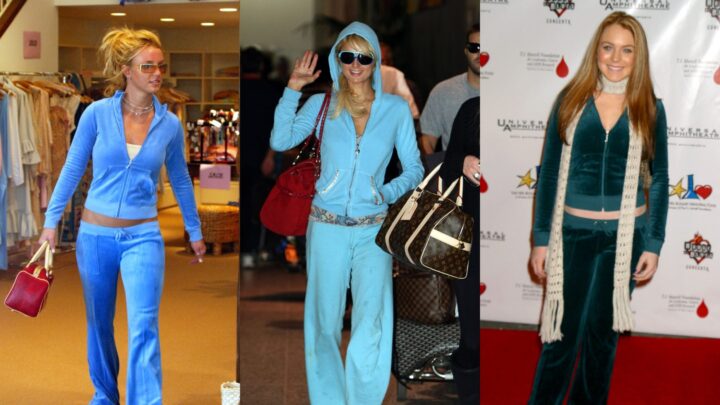Introduction
In the world of fashion, trends come and go, but some leave a lasting impact that sparks debates and controversies. One such trend that has been both celebrated and criticized is the iconic Juicy Couture tracksuit. Loved by many for its comfort and embraced by celebrities for its stylish flair, the tracksuit has not been without its fair share of controversies and criticisms. In this blog post, we’ll delve into the polarizing world of Juicy Couture tracksuits, exploring the debates about their appropriateness and cultural implications.
Comfort Meets Style
Juicy Couture tracksuits burst onto the fashion scene in the early 2000s, becoming synonymous with comfort and casual luxury. The velour or terry cloth fabric, bedazzled logos, and matching hoodie-and-pants combinations became a staple for those who wanted to blend relaxation with a touch of glamour. Celebrities like Paris Hilton and Jennifer Lopez were frequently spotted donning these tracksuits, turning them into a symbol of casual chic.
Critics argue that the tracksuit trend promotes a casual and laid-back lifestyle, potentially undermining the effort and sophistication associated with traditional fashion. Detractors view the tracksuit as a symbol of sloppiness, arguing that it blurs the line between leisurewear and acceptable public attire.
Cultural Appropriation Concerns
One of the most significant controversies surrounding Juicy Couture tracksuits revolves around accusations of cultural appropriation. Critics argue that the brand appropriated the tracksuit trend from working-class communities, particularly African American and Latino cultures, where tracksuits were worn as athletic or leisurewear.
The bedazzled logos and ostentatious designs, according to some, turned a utilitarian garment into a high-fashion statement, raising questions about whether the brand was profiting off the appropriation of a cultural aesthetic. Discussions about cultural sensitivity and the responsibility of fashion brands to respect the origins of their designs have been ongoing.
Reclaiming the Tracksuit
On the flip side, supporters of Juicy Couture tracksuits argue that fashion is an ever-evolving art form, and trends often find inspiration from diverse sources. They contend that the tracksuit, while originating from sportswear, has evolved into a symbol of empowerment for individuals who want to express their personal style with comfort.
Some argue that the tracksuit has been reclaimed by diverse communities and that the criticism surrounding cultural appropriation oversimplifies the complexity of fashion trends. They believe that the tracksuit has become a canvas for self-expression, breaking free from its humble origins and evolving into a symbol of inclusivity.
The Evolution of the Tracksuit
Over the years, Juicy Couture has evolved its tracksuit designs to stay relevant in the ever-changing world of fashion. The brand has introduced new materials, cuts, and styles, adapting to the shifting preferences of consumers. However, the controversies surrounding the tracksuit persist, reflecting the ongoing dialogue about cultural appropriation and the role of fashion in society.
Conclusion
The Juicy Couture tracksuit debate remains a fascinating intersection of comfort, style, and cultural sensitivity. While some view the tracksuit as a symbol of casual luxury and personal expression, others criticize it for appropriating elements from working-class cultures. As fashion continues to evolve, so too will the debates surrounding iconic trends like the Juicy Couture tracksuit. Whether you love them or loathe them, there’s no denying that these tracksuits have left an indelible mark on the fashion landscape.




buy norethindrone 5 mg for sale – aygestin 5 mg without prescription purchase yasmin online